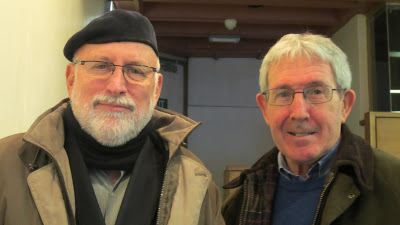Our Adventure on the 'Fletcher Christian' Part 2
In 2012 Mike Caulkett wrote Part 1 of his adventure on the ‘Fletcher Christian’, a twin-masted schooner, which set sail from Bermuda to Fiji in April 1970 with a crew that included four Bermuda policemen, Des McSherry as Captain, along with Mike, Tom Barnes, Eric Sanderson, and also Dave Ashurst who decided prior to the start of the voyage that he would sail just the first stage, from Bermuda to Puerto Rico. A wise decision by Dave! An even wiser man was Jack Rouse who had a financial interest in the yacht but decided to join the crew in Fiji!
Mike readily admits that, “a more inexperienced crew you could not imagine.” They had great difficulty even sailing out of Hamilton Harbour, and their mishap with the ship’s cat Jinx (no relation to Jinx Darrell) was indicative of their sailing savvy.
We are delighted to bring you Part 2 of the Fletcher Christian story. Mike picks up the saga as the ‘Fletcher Christian’ and crew are being towed into Puerto Rico.

Mike at the helm during crossing
The US Coastguard boat ‘Point Ward’ took us under tow and we were eventually taken into San Juan Harbour where we were tied up at an old jetty quite close to the old town of Puerto Rico and not too far from where the cruise ships are berthed. I can’t speak highly enough of the US Coastguard, particularly the skipper of the ‘Point Ward’ who helped us enormously during our time in PR including arranging social events for the crew, who I think they saw as being a very unusual/exotic group….. Probably rightly so. I think it’s also true to say that the skipper, who’s name I regret I can’t recall became slightly infatuated with Jane the nurse on our crew and the only unattached female on board. Unfortunately our gallant skipper was a married man and I think this might have caused him difficulties at home.
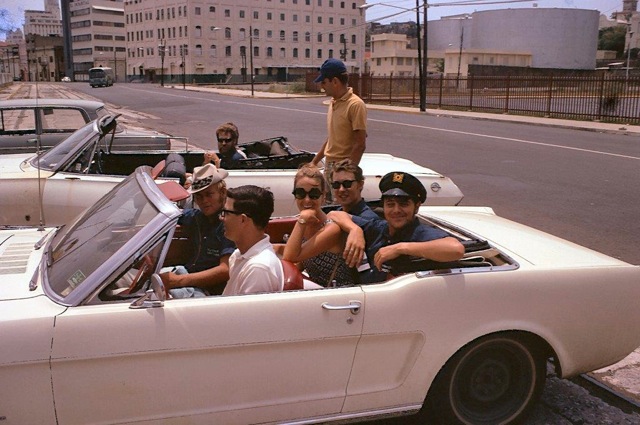
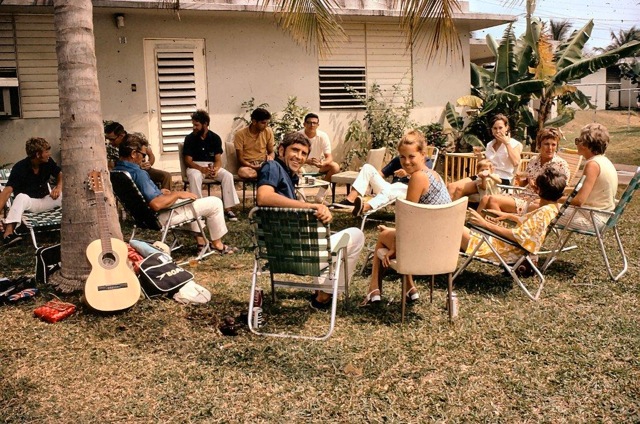
Crew invited out in Puerto Rico
There was of course much to do while in Puerto Rico with top of the list the need to find and install a new engine before we could leave and continue our trip south. For a start it is a legal requirement that all vessels must have an engine in order that they can motor through the Panama Canal. Purchasing of engines and such matters was not something that involved all the crew, but fell to Des to find a suitable engine and for him and the American backers to resolve financially.
Actually, top of my list was to have few beers and relax after the first part of our adventure which to date, had at times been quite eventful. A day or so after arriving at the dockside in San Juan I decided, with others, to inflate the lifesaving rubber dingy that had been stored on the deck to be used in the event that we had to abandon ship whilst at sea and have a potter about San Juan Harbour. I think I had to pull a tab or something and the dingy inflated. Great, it works. We managed to get it into the water and a couple of the crew sat on the inflated sides waiting for me to get in. I joined them and with a paddle we started to explore the harbour. However, we had not gone very far when I stood up on the rubber bottom of the boat to change position and went straight through and into the waters of the harbour leaving the others sitting on what was now a rather large rubber, bottomless ring. The bottom was perished and had we had to use it for its intended purpose we would have undoubtedly perished, rather like the dingy. We had a quiet word with Des and newer life rafts were later purchased.
The original plan, as I recall it, was that we that we would only be in Puerto Rico for a few days to restock and check things over before crossing the Caribbean to South America, but that all changed when the engine packed up leaving Bermuda and it was clear we were going to be in PR for much longer. In view of this we set out to discover some of the local hotspots that we would be frequenting during our time there, the Black Angus being one that immediately springs to mind. Having said that, not somewhere you would take your mother, but one that provided many an entertaining evening for the crew. Tom Barnes and I, being the most enthusiastic about alcohol, also discovered a great bar in the old town where we met some very interesting characters who treated us as if we had landed from the moon. I would love to tell more about some of Tom and my exploits while in San Juan, but I am not sure how long the Statute of Limitations is in that part of the world! Suffice to say that we had a brilliant time on all fronts!
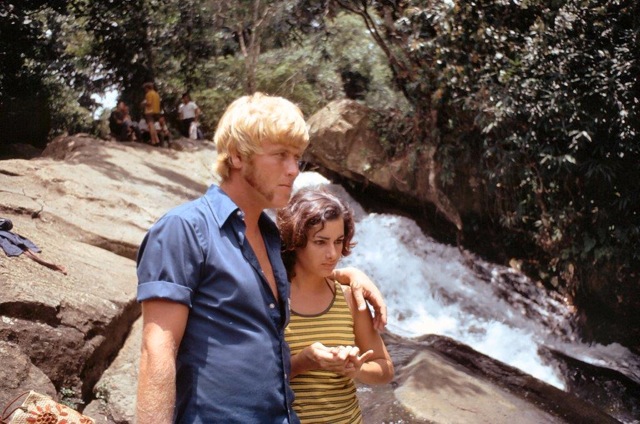
Tom Barnes and friend in the Rain Forest, Puerto Rico
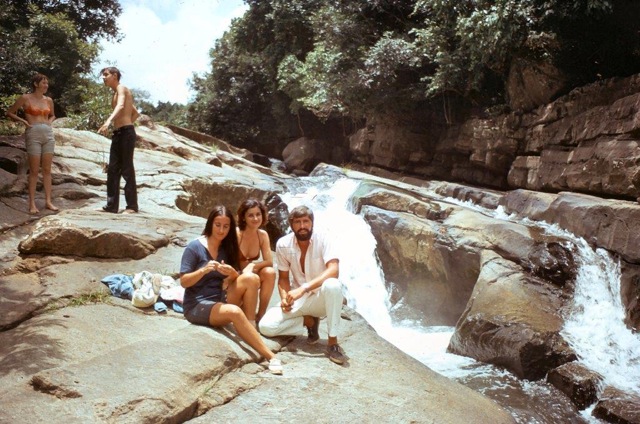
Mike toughing it out with friends in the Rain Forest
Returning to the problem of the engine. Des had been working very hard tracking down a replacement engine and after we had been in San Juan for a few days he took some of us to see an engine that he had found which he thought would suit the Fletcher Christian very well. Compared with the huge, old, dirty, now defunct, two piston Grenna engine currently installed in the FC the new one looked small, but really smart. It was a bright yellow, spotlessly clean, Caterpillar marine engine, although unused and still on wooden blocks it was a few years old and as I recall it there was no paperwork with it. Judging by its size compared with the old engine it was difficult to accept that it would be man enough for the job, but the engine was purchased and our thoughts turned to getting the old engine out from the engine room of the FC to make room for this much smaller replacement.
The old engine was, as I have said, very big and there was very little space to move around it in the engine room and I believe it weighed around seven tons with the enormous crank shaft weighing about three tons on its own. Working under the guidance of Colin, the crew’s Scottish engineer, Tom, Eric and I started to strip down the old engine. It was fairly simple job to start with as we removed some of the smaller parts attached to the main engine using mostly block and tackle, but we had to think again when it came to the engine block, two pistons and the aforementioned crank shaft. For this Des ordered a very large crane, the trouble was that due to its weight it could not move on to the jetty we were moored at which could have collapsed, so had to work from some distance away and as a result was right on its lifting limit with the larger parts. We spent many days stripped to our shorts working in very hot and sweaty conditions covered in filthy grease from head to toe, but finally the last part of the engine was deposited on the jetty alongside the FC. During this time the only means we had of getting clean was by standing in a rundown washroom forming part of the dock buildings where the only water was cold and appeared out of a pipe in the ceiling in a single stream of water with no such refinement as a shower head. Cold water and grease are not a good mix so we had to cover our bodies in a degreasant before getting under the flow of water. As a result, although reasonably clean we didn’t always smell so good.
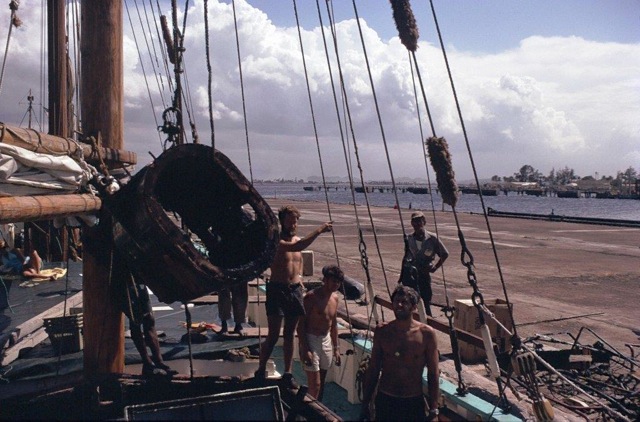
Removing part of the old engine
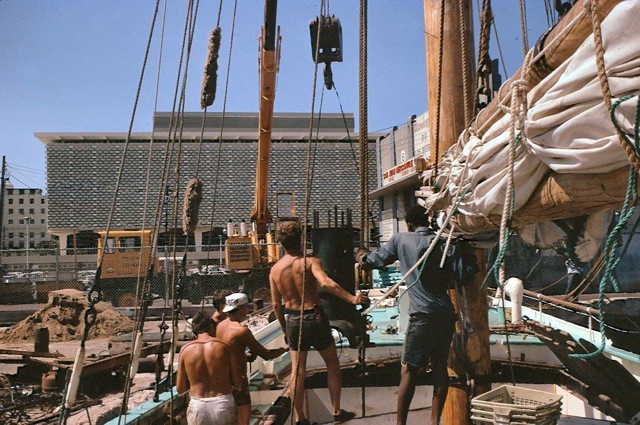
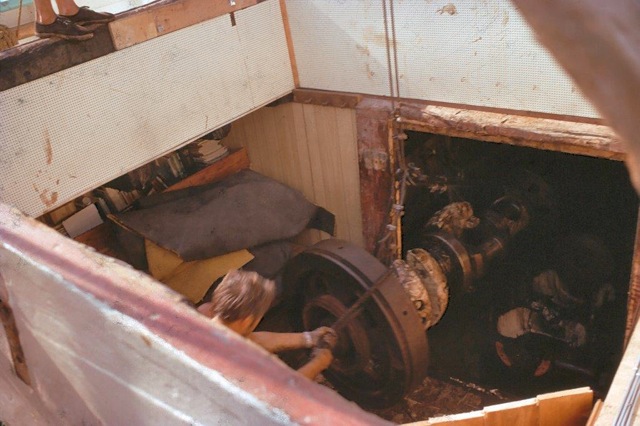
Removing huge crankshaft with block and tackle
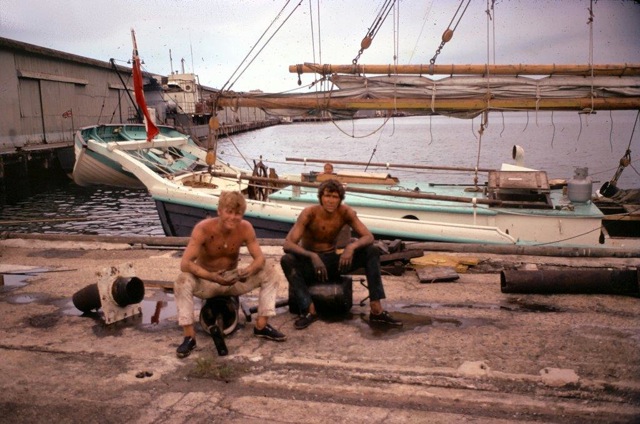
Tom and Mike covered in grease from stripping old engine
Now the dismantled engine stood on the dockside and Des’s mind turned to how to dispose of it, hopefully for its scrap value. However, after many approaches to lots of people it became apparent that, rather surprisingly, nobody was interested in the old engine, even for nothing, which was a bit sad really considering that it had propelled the boat through the seas for over 100 years. So, how to dispose of it?
Fortunately, life at this time wasn’t all work and as I have alluded to earlier we had a good time and many were the days we would arrive back at the boat a little worse for drink after a night in old San Juan. I don’t know how it started or who started it but we took to manhandling a different part of the engine to the edge of the dockside each night and tipping it into the harbour. Well, I can assure you that the very large parts made quite a noise when they hit the water and caused a huge plume of water to rise up. This was very entertaining to us in our inebriated state, but very disconcerting for the poor chap in charge of security who would come rushing out of his little shelter to see what the noise was about. Fortunately, by the time he got to us the water had settled down and there was no sign of the offending part which was by then lying on the sea bed. I know, it was totally irresponsible, but good fun and it was repeated over several nights until all sign that the engine ever existed were gone. Strange to think, it is probably lying there now undisturbed after 40 odd years.
So the old engine was gone, the engine room was now empty and cleaned out ready for its new occupant, the beautiful, yellow Cat. What was to follow we knew was going to be difficult, not only did the new engine have to be installed in the engine room but it had to be aligned perfectly with a new shaft to drive a new propeller. Once that was done it would be necessary to fit a new exhaust and electrical systems etc., etc. The new engine was duly delivered to the boat and if I remember correctly was lowered by crane into the awaiting engine room.
Beyond bolting the new engine into position there wasn’t much more we could do from inside the boat at that stage before it was dry docked for the new stainless steel shaft to be fitted between the engine and a new prop. Before being dry docked Des made contact with contacts/backers in America to track down a propeller of the right size and pitch for the size of the engine and boat. After a few days a reply and question was received from America. (Probably by telex, remember that?) “We have tracked down two propellers of the right size and pitch, but we need to know what turn the engine is, left or right”! (The following is in laymen’s terms and is to the best of my, not very good, knowledge of these things) Marine engines when fitted as a single engine would normally turn to the right, however, if fitted as one of a pair the engines, with two props, need to turn in opposite directions to match the flow of water from the props.
Now there was another big problem, as I said earlier the engine that had been purchased was unused, some years old and had no paperwork to tell whether it turned left or right, and it was critical to know. In the end a decision was made on the basis that as it was a single engine when purchased with no sign of a partner so there was a very good chance that it would turn to the right. As a result the American contacts were told to fly down the prop that turned to the right. And that was that and a few days later a beautiful, brand new shiny brass prop arrived and put onboard.
We were then towed to another part of San Juan where we were dry docked and saw for the first time the parts of the boat that had, hitherto, been under water and we couldn’t believe how much sea life, barnacles etc. was attached to the hull.

Mike & Colin with encrusted hull in dry dock Puerto Rico
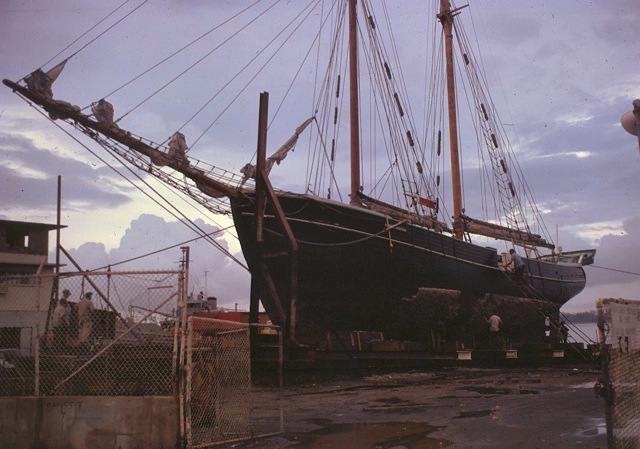
'Fletcher Christian' in dry dock in Puerto Rico
Living on board whilst dry docked was not good, the yard was dirty and we had to climb long dirty metal ladders to get on board. We were also some distance from our haunts in the old town that we now needed a ferry to reach. There is one little story I remember which I can relate. I had been drinking in the old town and had lost contact with the crew members I had been with and I had also missed the last ferry back to the shipyard and the FC. I made my way down to the ferry point and settled down in an area with lots of old rummies who were clearly not waiting for a ferry, but never mind, needs must. I was lying there, dozing when I realised that someone was going through the pockets of one of my, near unconscious, companions. Stupid I know but, with ten years police experience behind me I just couldn’t watch this happen without doing something about it. I leapt or possibly staggered to my feet, shouted at the thief who looked at me as if I was mad before he started to run off with the stolen goods with me in hot pursuit at the same time shouting at him. The result was that he threw away the stuff he had stolen and I decided not to make a citizen’s arrest…..probably wise considering my own inebriated state.
I gathered up the bits and pieces took them back to the victim and tried to tell him what had happened. He proved impossible to rouse which is not a bad thing as explaining what had happened would not have been easy. I put the stuff back in his pocket and went back to waiting for my ferry, keeping a wary lookout for the aggrieved offender. I have often wondered since what might have happened if someone had seen me returning the property to the victim, would they have believed me when I said I was returning it rather than stealing it? Probably not, which could have had very serious consequences for me.
We were quite a long time dry docked during which time the new stainless steel drive shaft was fitted to the engine at one end and to the new propeller at the other and the accumulation of barnacles etc. were scraped off the hull which was also treated with anti fouling paint. Eventually, we were really pleased to be towed back to our original old jetty where we set about building and fitting a new exhaust system, engine controls and electrical system. This all took some time, but eventually, under the expert guidance of Colin, all the systems were connected and we were ready to fire up our lovely new engine. The ignition key was turned by Des and the engine started instantly, ran very smoothly and sounded very powerful………..fantastic, we are in business again.
I should explain that the direction of travel was controlled by a tall joy stick type lever, pushing it forward caused the boat to move forward and pulling it back caused the boat to move backwards with the speed being controlled by a second similar lever alongside the first. Simple you would think! Having run the engine in neutral for a while Des decided to test it by pushing the first lever forward and yes, you’ve guessed it, the boat moved backwards, pulling it back caused the boat to move forwards – IT WAS THE WRONG BLOODY PROP – we should have had the other one that had been available. Disaster, with more costly delays facing us to sort out this latest problem.
But first, let’s get drunk. I was really fed up and quite angry over the whole situation so after more rum than was good for me I jumped into the harbour with the intention of removing the prop myself. Foolish boy. We spent some considerable time with me in the water and other members of the crew lowering a spanner about 5’ long down to me on a length of rope. The idea being that I would fit it on to the big nut retaining the prop on the shaft and they would then pull the spanner up using the rope to undo the nut. Without the rope the spanner would have taken me swiftly to the bottom of the harbour. Needless to say this stood no chance of success whatsoever and after a period of time we gave it up as a bad job. The only lasting effect of this little venture was that for days after I reeked of marine fuel and other nasties from the harbour water.
Arrangements were then made for workmen from the dockyard that had fitted the shaft and prop to come over and remove the prop pending delivery of the correct prop. They too failed to shift the bloody thing and in the process and after several hours of trying, bent every drawing tool they had and I realised that there is more to securing a prop to a shaft than meets the eye. I think the security comes from the tapered end of the shaft being fitted into a tapered hole in the prop and the two being glued together with some substance and finished off with a bloody great nut. So even when the nut was off, the prop could not be easily removed. Makes sense really and something I would normally be pleased about, not wanting your prop to drop off while at sea, but it had to come off, you can’t reverse across the Caribbean and through the Panama Canal!
Local people we met in bars suggested several ways of removing the offending prop, including blowing it off with explosives. Needless to say this means was not adopted, particularly as the hull had been re-caulked whilst in dry dock and there was a real risk this would have been dislodged. In the end a team of Americans managed to remove the prop and the correct one was flown down from America and fitted. Sometime after this we finally set sail once again heading for the coast of South America and from there to the Panama Canal.
At some stage whilst in the dry dock, Eric slipped (can’t think why!) when climbing one of the metal ladders and injured his shin. More of that later.
The journey across the Caribbean to Santa Marta on the north coast of Colombia in South America was fairly uneventful. The new engine being used when there was little or no wind performed perfectly. It was however very, very hot.

Mike relishes pineapples during crossing of Caribbean Sea
One event that does stick in my mind involved the single toilet or head which we had installed on the boat. The process of using it was quite simple and went something like this; Use the toilet then using a lever about 18” long attached to a pump move the lever vigorously backwards and forwards to pump the offending items out along a clear plastic tube through a hole in the side of the boat and into the ocean. Simple, you would think, however, on one occasion someone said that they had used the toilet but that the pump didn’t seem to be working. An attempt to use the pump by several of the men confirmed this and in the end most of us were gathered in the small toilet. More and more force was applied to the pump handle in an attempt to clear what we thought was a blockage.
All of a sudden the pipe separated at the point it left the boat and I can assure you that all those crammed into that small area moved as one and at lightning speed to avoid the consequences of the pipe flailing around and discharging its contents. After a big clean up the problem was resolved quite quickly by someone who noticed that the flap that sat at the end of the pipe had not been moved to the open position before attempting to pump the contents into the sea causing a complete blockage. Sorry if it isn’t as funny in the recalling as it was at the time, and since, for those that were there.
We attracted a lot of attention in Santa Marta from locals who were ever present on the dock where we were moored. Despite security precautions being taken someone did get on board and stole a really nice pair of binoculars that my now wife Jill had bought me before we left Bermuda.
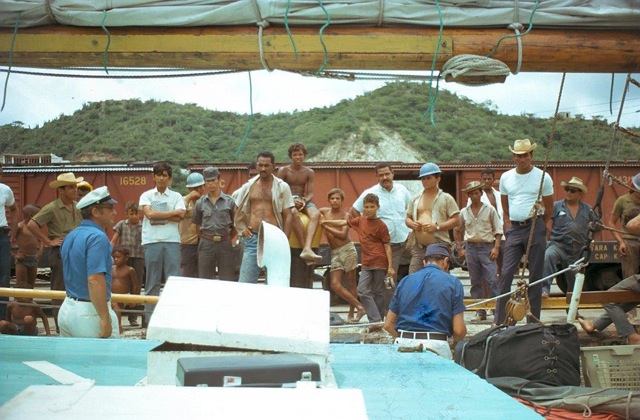
Watching out for locals watching us in Santa Marta!
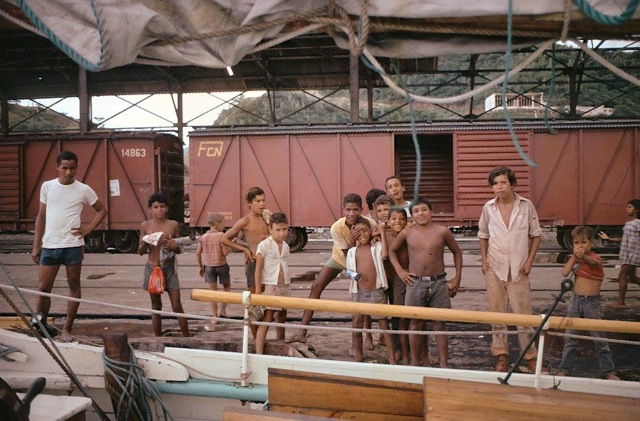
After a short stay in Santa Marta we set sail for the Panama Canal and what turned out to be, without a doubt, the most stressful experience of my life. Des informed us that on arrival at the gates to the Panama Canal Harbour all we had to do was use a powerful torch to flash a certain message in Morse and that we would receive a return signal by the same means that would permit us to pass through the gates and moor.
We arrived late at night in the dark and as suggested started flashing the torch towards the gates and waited for a return message. Nothing at all was seen; just pitch black, apart from the red and green lights on either side of the harbour entrance. After many more attempts to get a response we realised that our Morse skills were not what they should have been and gave up trying. A decision was made to wait until daylight which was several hours away. It turned out that my watch was on duty and Des instructed me to motor about!! until morning and duly went to his cabin to sleep.
So there I was, in charge of the boat motoring about in the pitch black in probably the busiest area of concentrated shipping in the world. I couldn’t see the coast which I knew was quite close and all the times as I looked out to sea all I could see were the lights of large tankers and cargo ships of all sizes coming over the horizon and bearing down on the small area of sea that the ‘Fletcher Christian’ was pottering about in.
I worked out a plan, using the port and starboard lights of the approaching ships to determine at what point it would pass behind the FC. After it had passed us, too close for comfort I would turn the FC about and perform the same procedure with the next approaching ship and this went on for hours and hours. How Des managed to go to his bunk and sleep leaving someone in charge of the boat in this situation who only a few months before had been a bobby in Bermuda I do not know. The annoying part of the whole thing was that as the ships mentioned above approached the gates to The Panama they flashed a signal, received one back and just motored through the gates.
This continued, with me going greyer by the minute, until morning when, as I recall it we motored through the gates and joined the many of ships of all descriptions waiting their turn to pass through the canal. Not sure how long we had to wait, but it eventually became our turn to enter the canal. We were always locked along with a larger ship or tanker which were huge and only just cleared the sides of the locks. We on the other hand had space all around us and to keep us central in the locks when the water was rushing in or out we had to purchase new rope and provide a man on each quarter to keep the boat as central as possible which required quite a bit of effort from those on the ropes. Travelling the length of the Panama Canal with its massive locks and beautiful peaceful lakes was an experience not to be missed.
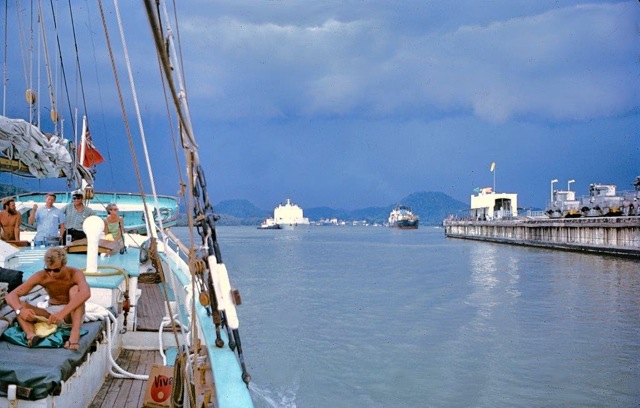
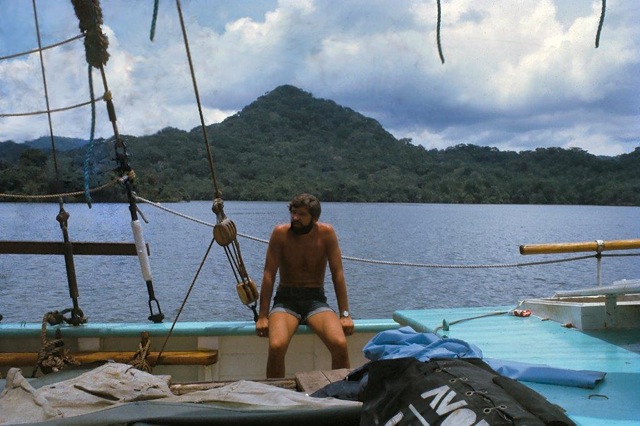
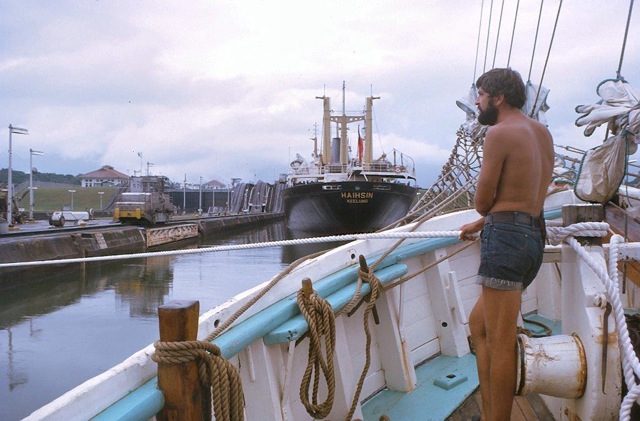
Passing through the Panama Canal
On arrival at Cristobel on the Pacific side of the Canal we moored in the large harbour to prepare for the next part of our trip which was to sail to the Galapagos Islands. It’s true to say that for a variety of reasons, not least of all the delays in Puerto Rico caused by the engine problems, strains were starting show in some of the relationships on board and Des became more the captain of a ship rather than the friends and colleagues that some of us were when we set out. We had quite a bit of down time whilst in Cristobel and much of this time was spent in a yacht club overlooking the harbour with a good view of the Fletcher Christian on its mooring. One of these afternoons a group of us were enjoying time in the club when Des came in, clearly unhappy, wanting to know which watch was on duty. The delays had caused financial difficulties for those involved on that side of things and I think Des was under great pressure. He related to us stories he had heard of people breaking into boats moored in the harbour and demanded that the boat have a watch on board at all times. Considering our earlier relationships I was unhappy with the way that Des spoke to us, particularly Tom and me. After this tetchy exchange I started to consider my position and wondered if it was worth going on if the atmosphere on board, particularly when at sea, had deteriorated to the point that it was no longer going to be enjoyable. After all we were not being paid, in fact we had paid for the privilege of making the trip. Taking everything into consideration I made the decision to leave.
Despite things ending on a slightly sour note for me, I have to place on record the fact that I have total respect for Des and for everything he achieved whilst I was on board and after, he is an extremely capable individual. He should take enormous credit for and pride in turning his dream into reality and sailing the Fletcher Christian safely from Bermuda to Fiji. A huge responsibility and no mean feat for an 'amateur sailor'.
After leaving the boat I spent some time in Panama considering my options. As required by Fijian immigration I was already in possession of a flight ticket from Fiji to Australia, but I had insufficient funds, due to the delays we had experienced, to fly from Panama to Fiji, Neither did I have sufficient funds to fly from Panama to the UK. In view of this predicament I had no choice but to set out to travel overland from Panama by whatever means possible, to a point where the distance to the UK was less and I could afford to fly home.
I set out overland using local buses, my feet and my thumb and made my way to New York through Costa Rica, El Salvador, Guatamala, Mexico and the States. On leaving Panama I met up with an American student, Barry Farcas, who had been teaching in Bogota and was making his way back to the States by the same means as me and we benefited from having each other’s support when passing through some of the countries mentioned. Not least of all because Barry spoke Spanish. Some years ago, Barry, now a doctor, visited us in the UK with his wife and child. On arriving in New York in a weary and dishevelled state I recuperated by staying with Dave (Admiral) Long who’s wedding to Penny I had been the best man at some years earlier. Unfortunately, Penny was visiting her family in Bermuda so I didn’t see her. (The total distance travelled from Panama to New York was 7,272miles, give or take)
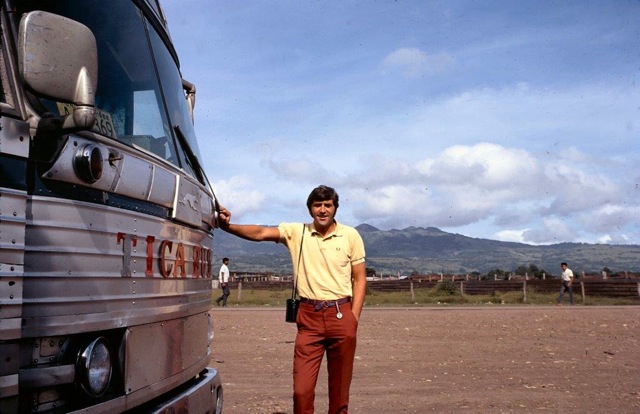
Mike on the way home overland - Panama to New York
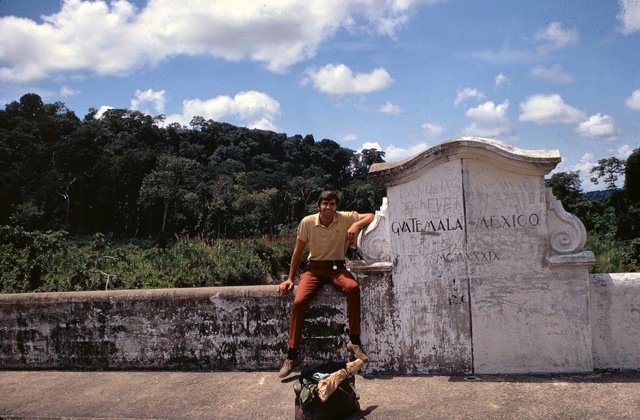
Mike heading for home and stopping for a moment at the Guatamala-Mexican border
I eventually flew back to the UK where I did what I said I wouldn’t and rejoined the Sussex Police Force. (Not much call for Baltic Trader Crew in the UK so best to stick with what you know) I plan to cover my life since getting home when I get round tocompleting my much promised ‘Then & Now' for Roger and the Expobermuda website.
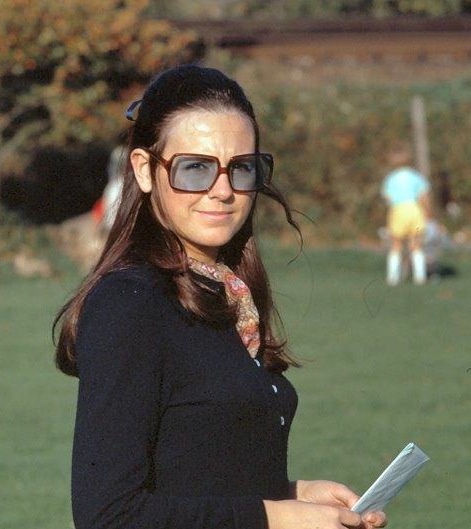
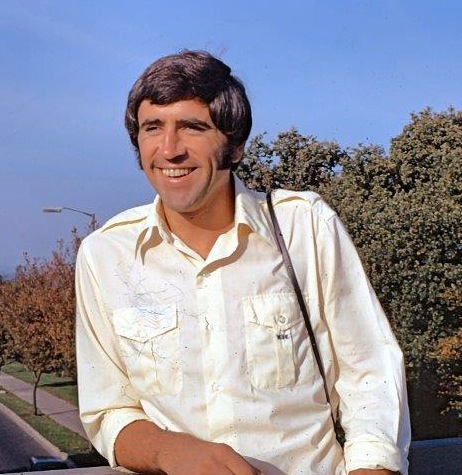
Jill and Mike settled in Sussex
I made mention earlier of Eric Sanderson injuring his leg in the dry dock. As I was unsure of what had happened to him after I said cheerio to him in a hospital in Panama I e-mailed him in Australia and this is what Eric said about his injury.
"I injured my leg in Puerto Rico but the infection didn’t kick in badly until we reached Panama and then I was rushed into the Gorgos US hospital and was lucky not to lose my leg. In fact they told me I would probably wake up without it but in the end they cut out all the bad stuff. I then stayed with an American/Panamanian family for nearly three months to convalesce and then flew on to the Galapagos Islands where I rejoined the boat and from there stayed with the boat until it reached "Fiji.
The ‘Fletcher Christian’ did make it to Fiji and there were many more interesting stories that I have learned about from Tom Barnes who I remain in close contact with. In 1972 my wife Jill was flying with BOAC and on a trip to Fiji went out on a day trip on the ‘Fletcher Christian’ so I knew that it was being used for its intended purpose at that time. Although there were rumours I had no idea what had happened to it after that so I asked Eric as he had a much closer involvement than me. This is what he told me:
I left for Australia a few weeks after getting to Fiji but the FC operated as a day charter boat to an island called Navini for quite a while until hurricane ‘Bebe’ arrived, the eye of which was forecast to pass over the Lautoka Harbour where the FC was moored. Des (McSherry) took the boat 30 miles up the coast and anchored in a lagoon with chains attached to nearby trees to keep it in place when the hurricane hit. Unfortunately a steel hulled ship did the same upwind of us and the cyclone changed course and passed right over that spot. The upper boat broke away and drifted broadside to the FC and stove in the planking which sent the FC to the bottom. Within days the locals had dived down and stolen anything of value and the boat was unsalvageable
The end of the 'Fletcher Christian' and of my story.

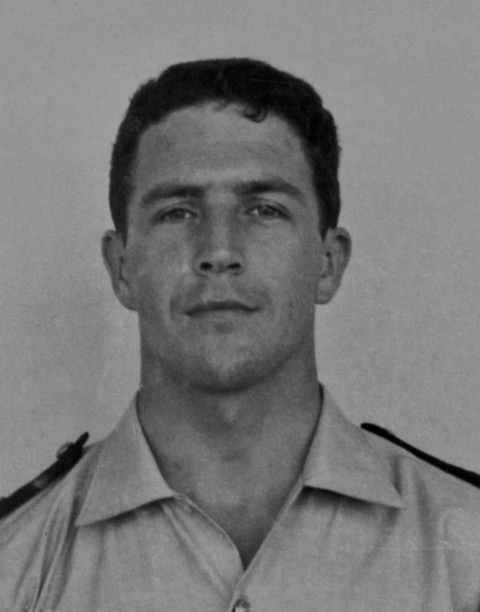 Young Constable John McQuaid
Young Constable John McQuaid